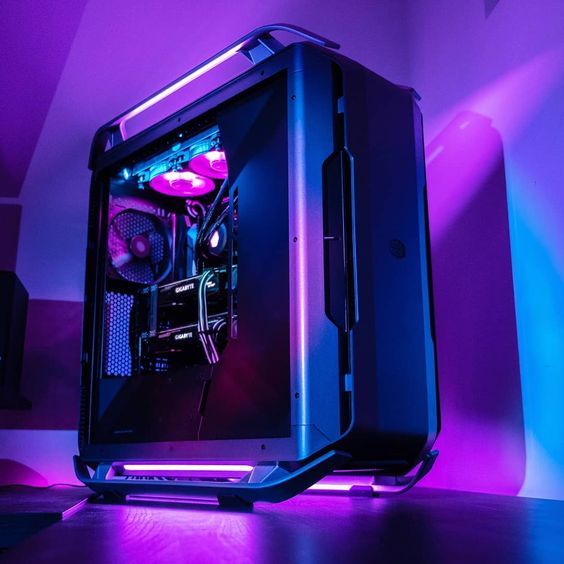In the world of gaming, the right hardware can be the difference between victory and defeat. Gaming PCs are at the forefront of this experience, offering unparalleled performance, stunning graphics, and smooth gameplay. Whether you’re an eSports enthusiast, a casual gamer, or a dedicated streamer, having a high-performance gaming PC is crucial. In this blog, we’ll explore the essential components of a gaming PC, how to choose the best setup, and why investing in a gaming PC can elevate your gaming experience.
Why a Gaming PC Matters
A gaming PC is more than just a regular desktop computer—it’s designed specifically to handle the high demands of modern video games. Unlike standard PCs, gaming PCs are equipped with powerful graphics cards, high-speed processors, and optimized cooling systems to ensure smooth gameplay even during intense action. These specialized machines allow gamers to run games at higher settings, offering better visuals, faster response times, and the ability to multitask efficiently (such as gaming and streaming simultaneously).
Key Components of a Gaming PC
1. Graphics Card (GPU)
The graphics card, or GPU, is arguably the most important component in a gaming PC. It’s responsible for rendering images, video, and animations, providing smooth frame rates and breathtaking visuals. High-end GPUs like NVIDIA’s RTX series or AMD’s Radeon RX cards allow for ray tracing and enhanced graphical effects, making your games look incredibly realistic. For most AAA titles, a mid-range or high-end GPU is essential for playing at higher resolutions (like 1440p or 4K) with high frame rates.
2. Processor (CPU)
The CPU acts as the brain of your gaming PC, handling all the calculations and processes behind the scenes. A fast, multi-core processor ensures that your system can run complex games without any lag. Popular gaming CPUs include the Intel Core i5/i7/i9 series and AMD’s Ryzen processors. For gamers who also stream or edit video, a higher-end CPU is essential for smooth multitasking.
3. RAM (Memory)
Random Access Memory (RAM) is crucial for running games and other applications simultaneously. Most modern games recommend at least 16GB of RAM, although 32GB is preferred for gamers who run demanding software or multiple programs at once. Faster RAM also helps reduce loading times and stutter in memory-intensive games.
4. Storage (SSD vs. HDD)
Solid State Drives (SSD) have revolutionized gaming by offering faster load times and improved system performance compared to traditional Hard Disk Drives (HDD). A gaming PC with an SSD ensures that your games load quicker and perform better, reducing in-game lag during cutscenes or level transitions. Many gamers opt for a combination of an SSD for their OS and games and an HDD for storing other files and media.
5. Cooling System
Intense gaming generates a lot of heat, so a proper cooling system is vital to keep your gaming PC running at optimal performance. Air cooling with high-quality fans or liquid cooling systems help maintain lower temperatures, preventing your components from overheating during long gaming sessions.
6. Power Supply (PSU)
A reliable power supply unit is essential to ensure that your PC components receive stable and efficient power. It’s crucial to choose a PSU with enough wattage to support your GPU, CPU, and other components, ensuring that your system runs smoothly without power interruptions or overloads.
Prebuilt vs. Custom-Built Gaming PCs
When it comes to gaming PCs, you have two options: buying a prebuilt system or building your own custom setup.
- Prebuilt Gaming PCs are a great option for gamers who want a ready-to-go system without the hassle of assembling it themselves. These machines are often tested and optimized by manufacturers to ensure that all components work together seamlessly.
- Custom-Built Gaming PCs offer flexibility and customization. You can select each component individually, ensuring that your PC is tailored to your specific gaming needs and budget. While building a PC can be intimidating for beginners, it allows for greater control over performance and future upgrades.
Gaming PC for Different Needs
1. Gaming PC for eSports
eSports games like “League of Legends,” “Fortnite,” and “CS” require high refresh rates and low latency for competitive gameplay. A gaming PC built for eSports should prioritize a high-end GPU, a fast CPU, and a 144Hz or higher monitor to ensure smooth, lag-free performance.
2. Gaming PC for AAA Titles
If you enjoy playing the latest AAA games, such as “Cyberpunk 2077,” “Elden Ring,” or “Assassin’s Creed Valhalla,” you’ll need a gaming PC capable of handling demanding graphics and large open-world environments. Look for a high-end GPU, plenty of RAM, and a CPU that can handle the complex calculations required for these expansive titles.
3. Gaming PC for Streaming
For gamers who also stream their gameplay, a gaming PC with both a powerful CPU and GPU is essential for smooth streaming without sacrificing game performance. Multi-core processors and at least 32GB of RAM are recommended for managing both the game and streaming software simultaneously.
Upgrading and Future-Proofing Your Gaming PC
One of the biggest advantages of gaming PCs is their upgradability. Unlike consoles, where you’re locked into a specific set of hardware, gaming PCs allow you to swap out components as technology evolves. This means you can start with a mid-range system and upgrade your GPU, CPU, or RAM as new, more powerful components become available, ensuring that your gaming rig stays future-proof for years to come.

